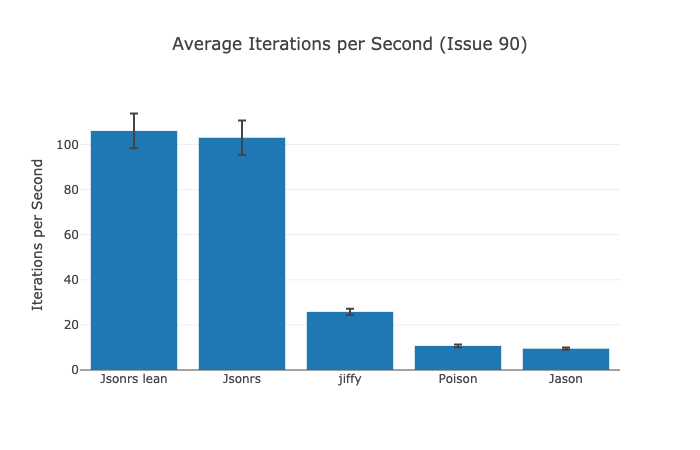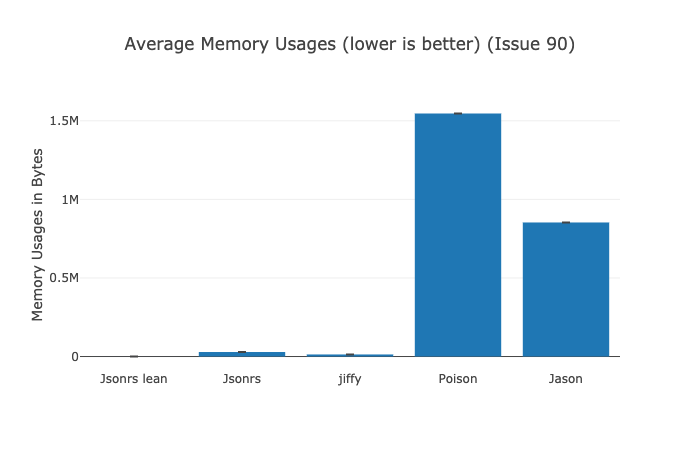A safe NIF-based JSON library for Elixir powered by Rust's Serde. API Documentation.
Add Jsonrs as a dependency in your mix.exs file.
def deps do
[{:jsonrs, "~> 0.1"}]
endJsonrs is much faster than other JSON libraries for Elixir, including other NIFs like jiffy.
It uses much less memory than other JSON libraries when operating in a mode with comparable features.
It has an API typical of Elixir JSON libraries. decode/1 encode/2 and encode_to_iodata/2 are available along with their raising ! counterparts, and structs can implement the Jsonrs.Encoder protocol to specify custom encoding.
Multiple operating modes allow you to turn off features you don't need for extra performance. In the default 2-pass mode, Jsonrs works like Jason and Poison and honors custom encoding of structs. In the opt-in 1-pass (lean) mode, Jsonrs will ignore custom encoding impls and operate more like jiffy.
Jsonrs is a 2-pass encoder by default.
The first pass involves mapping the input object according to any custom encodings implemented for types in the input. This is done in Elixir.
The second pass performs the actual encoding of the input to a JSON string. This is done in the Rust NIF.
If custom encoding defintions are not required, the first pass can be disabled entirely by passing lean: true in the encode opts. When operating in this mode, structs will always be encoded as if they were maps regardless of custom encoder implementations.
Jsonrs has different performance characteristics in different modes. In the default 2-pass mode, Jsonrs is comparable feature-wise to Jason or Poison and should always be much faster (~5-10x) and consume less memory (~3-30x) than either of them. In lean mode, Jsonrs is comparable feature-wise to jiffy and should always be faster (~3x) and use less memory (~100x+) than it.
For example, here is a benchmark of Jsonrs's speed and memory consumption compared to other popular JSON libraries when encoding the 8MB issue-90.json from the Poison benchmark data.
It is easy to see that Jsonrs dramatically outperforms Poison and Jason, while Jsonrs-lean similarly outperforms jiffy.
Jsonrs.decode/1 takes a JSON string and turns it into an Elixir term.
Jsonrs.encode/2 takes an Elixir term and a keyword list of options and turns the input term into a JSON string with behavior defined by the options. Valid options are:
lean: disables the first encoder pass (defaultfalse)pretty: turns on pretty printing whentrueor a non-negative-integer specifying indentation size (defaultfalse)
iex> Jsonrs.encode!(%{"x" => [1,2], "y" => 0.5}) |> IO.puts()
{"x":[1,2],"y":0.5}
iex> Jsonrs.decode!("{\"x\":[1,2],\"y\":0.5}")
%{"x" => [1, 2], "y" => 0.5}
iex> Jsonrs.encode!(%{"x" => false, "y" => []}, pretty: true) |> IO.puts()
{
"x": false,
"y": []
}defimpl Jsonrs.Encoder, for: [MapSet, Range, Stream] do
def encode(struct), do: Enum.to_list(struct)
endJsonrs is built on the backs of giants. It is connecting the Rust libraries Serde_rustler and Serde_json, exposing them to Elixir through Rustler, and wrapping the NIF in an interface inspired by Jason. Without these projects, Jsonrs probably wouldn't exist.

